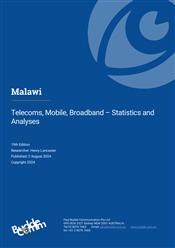Malawi Telecoms Market Report
Telecoms, Mobile and Broadband - Statistics and Analyses

Publication Date: April 2024
Report Pages: 93
Lead Analyst: Henry Lancaster
Contributing Analyst: Peter Lange
Malawi’s telcos reduce cost of data packages during pandemic
With few resources, Malawi is one of the world’s least developed countries. There has been little investment in fixed-line telecom infrastructure, and as a result, the country’s two mobile networks Airtel Malawi and TMN provide the vast majority of connections for voice and data services. Both operators have invested in LTE technologies to improve the quality of data services. The lack of market competition, together with limited international internet bandwidth, has also resulted in some of the highest prices for telecom services in the region. The government in late 2020 secured an average 80% reduction in the cost of data bundles offered by the MNOs. Following continuing customer complaints, the regulator in mid-2021 ensured that costs were again reduced, this time by about a third.
Mobile penetration remains low in comparison to the regional average and so there are considerable opportunities for further growth, particularly in the mobile broadband sector. Low penetration is partly attributed to the lack of competition, though there is the possibility that a new play come launch services by the end of 2022.
The internet sector is reasonably competitive, with about 50 licensed ISPs, though the limited availability and high cost of international bandwidth has held back growth and kept broadband access prices among the highest in the region. These limitations are being addressed, with the second phase of the national fibre backbone having started in mid-2021.
Key developments:
- TNM Mpamba m-money service partners with Mastercard;
- Telecom regulator launches the five-year Universal Service Fund (USF) Strategic Plan;
- Telcos agree to reduce cost of mobile data packages;
- Government urged to reduce rate on several ICT taxes contributing to high cost of internet services;
- TNM partners with the PPPC to provide free wireless Internet services nationally;
- Government begins review of the National ICT policy and the Malawi Digital Broadcasting policy;
- Airtel Africa completes sale of its tower unit in Malawi to Helios Towers;
- Regulator uses USF to install mobile towers in rural areas, to be leased to Airtel Malawi and MTL for a fee;
- Regulator leans on Universal Access Fund to improve mobile services to rural areas;
- Report updates include recent market developments, regulator’s market report for 2020, operator data to Q4 2021, updated Telecom Maturity Index charts and analyses, recent market developments.
Companies mentioned in this report:
Malawi Telecommunications (MTL), Access Communications (ACL), Bharti Airtel (Zain, Celtel), Telekom Networks Malawi (TNM), G-Mobile (GAIN), Celcom, ESCOM, MalawiNet, MTL Online, Skyband, Globe Internet, Broadmax, Burco
Related Reports
- Africa - Mobile Infrastructure and Mobile Broadband
- Africa - Mobile Network Operators and MVNOs
- Africa - Fixed Broadband Market - Statistics and Analyses
- Mozambique - Telecoms, Mobile and Broadband - Statistics and Analyses
- Chad - Telecoms, Mobile and Broadband - Statistics and Analyses
- Libya - Telecoms, Mobile and Broadband - Statistics and Analyses
- Cameroon - Telecoms, Mobile and Broadband - Statistics and Analyses
- Eritrea - Telecoms, Mobile and Broadband - Statistics and Analyses
- Lesotho - Telecoms, Mobile and Broadband - Statistics and Analyses
- Benin - Telecoms, Mobile and Broadband - Statistics and Analyses
Share this Report
TMT Intelligence
A platform to scale your intelligence tasks
Monitor critical insights with our AI-powered Market Intelligence Platform gathering and analyzing intelligence in real time. With AI trained to spot emerging trends and detect new strategic opportunities, our clients use TMT Intelligence to accelerate their growth.
If you want to know more about it, please see:
Research Methodology
BuddeComm's strategic business reports contain a combination of both primary and secondary research statistics, analyses written by our senior analysts supported by a network of experts, industry contacts and researchers from around the world as well as our own scenario forecasts.
For more details, please see:
More than 4,000 customers from 140 countries utilise BuddeComm Research
Are you interested in BuddeComm's Custom Research Service?
Hot Topics
News & Views
Have the latest telecommunications industry news delivered to your inbox by subscribing to BuddeComm's weekly newsletter.